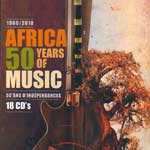There could hardly be a more fitting subject of a final CD review for the first decade of the 21st century. This 18-CD collection aims at nothing less than summing up African music during the 50 years since independence fever swept the continent. (Seventeen African nations turned 50 in 2010 alone.) The compilation is organized in six categories: East, West, North, South, Central and Lusophone Africa. Each category gets three CDs. There are 185 songs in all. It feels like a lot, and to listen through is to be amazed and dazzled by the scope and brilliance of one continent’s music. Nearly everything here sounds good, from the classical style of Egypt’s Umm Kulthum, to the rumba ruminations of the Congo’s Franco, to the township jive of the Soul Brothers. This is a delightful and dizzying panorama, and without a doubt the best collection of its kind available.
There are plenty of hits here: Prince Nico Mbarga’s “Sweet Mother,” Manu Dibango’s “Soul Makossa,” Mory Kante’s “Yeke Yeke,” Miriam Makeba’s “Pata Pata.” Sometimes the hit focus is unfortunate. Mahlathini and The Mahotella Queens certainly ruled the charts with their reggae-tinged “Kazet,” the choice here, but with that as their pick, we never hear the band’s signature, earth-shaking mbaqanga sound, all the more unfortunate because there’s no space for lesser mbaqanga acts either. Nigerian juju music is also a surprising casualty. We do not hear from King Sunny Ade, Ebeneezer Obey, or any of the genre’s lesser stars. Such a glaring omission stings that much more when the collection somehow finds space for two tracks by Guinea Bissau’s Super Mama Djombo—an odd choice for the only act to merit a double shot. One can imagine that the licensing issues here must have been daunting, and certainly that forced certain choices and omissions. Perhaps this is why all the North African rai tracks come from the 80s, before the sound had fully matured.
Obviously, it’s easy to find fault with such an ambitious summation of genres. No two African music aficionados would pick the same tracks, even if they could have anything they want. So it is important to say that most of the choices are spot-on. “Mandjou” is indeed the quintessential Salif Keita track. And no song better encapsulates the genius of Thomas Mapfumo than “Shumba” (although this legendary 1980 release is strangely mis-dated to 2006—a mere quarter-century off the mark.) That said, most collectors will find things here they do not know, particularly in the less exposed Lusophone areas. For me, the group Africa Negra from Sao Tome/Principe was a particularly satisfying discovery.
The selection is weighted toward styles that express the celebratory optimism of new independence, rather than those that reflect the skeptical disillusionment experienced by the continent’s current hip hop generation. This bias is appropriate and helps the set maintain a kind of unity in the face of kaleidoscopic diversity. A series of essays, most written in French and translated into English, offer welcome context. They focus more at the level of history and cultural change, not on individual songs and artists, but they do enhance an appreciation of the music, and help newcomers understand the common threads.
Afropop fans will not be surprised that the subject is finally too large to fit within even a box set as rich as this one. But this is an admirable attempt at the impossible, one that sets a high bar for future efforts. Collectors will feel compelled to own it, and newcomers could hardly hope for a better introduction to the music of modern Africa.
-Banning Eyre









